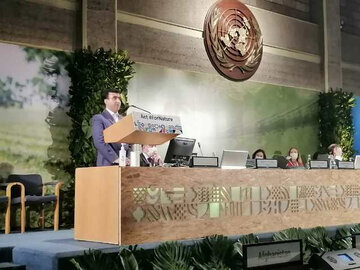Environment should not be sacrificed for political gain: DOE chief

TEHRAN – Ali Salajegheh, Department of Environment chief, has said that the environment should not be sacrificed for political gain.
“The present decade is the decade of ecosystem restoration through revision, re-creation and reconstruction, an opportunity to accelerate the implementation of sustainable development goals, especially the 11, 13, 14 and 15 goals,” he added.
He made the remarks in the Fifth Session of the United Nations Environment Assembly (UNEA-5) held online in Nairobi from February 28 to March 2.
“Certainly, using scientific evidence, nature-based solutions, knowledge of traditional ecology, climate action, the capabilities of youth and women, and the capacity of indigenous communities to rehabilitate ecosystems are essential in this regard.”
Iran, as the source of many valuable genetic resources in the world and the primary and secondary diversity of important plant and animal species with more than 2,200 endemic plant species and unique habitats including Zagros and Hyrcanian forests, has taken several measures to preserve its rich and valuable biodiversity and increase protected areas.
Despite the water and climate tensions that Iran and West Asia are facing, supporting the sustainable livelihoods of wetland communities through modeling measures and the creation of micro funds are among Iran’s other efforts to preserve this ecosystem.
Iran, having the largest water border with the Persian Gulf and the Sea of Oman, has tried to add 3,000 hectares to the country’s mangrove habitats; develop a plan to monitor, protect and manage Caspian seals, humpback dolphins, and sea turtles; establish forty fixed stations for continuous monitoring of marine ecosystems; protection, conservation and restoration of sensitive coastal habitats; adaptation to the phenomenon of climate change in onshore and coastal areas and combating plastic and microplastic pollution, improvements in ecosystem status and marine biodiversity and reduce pressure on water resources,” he said.
He mentioned the preparation of a national action plan for the protection of the marine environment in the priority areas of climate change, biodiversity, marine pollution, public participation, capacity building, and increase of coastal and marine protected areas as other actions of the country in this field.
“Escalating climate crises”, “insecurity”, “lack of regional integration to address environmental challenges”, “unilateral politico-economic sanctions” and “illegal harvesting and trafficking of wildlife”, “valuable and endangered species”, “drying wetlands” and “dust storms” pose a serious threat to biodiversity, rich habitats, and ecosystems, he emphasized.
While inviting the international community to work together, cooperate, converge and co-invest in strengthening national, regional, and international efforts to preserve nature, Salajegheh called on the member states not to sacrifice the environment for political gain.
He further announced readiness to welcome any international cooperation and initiative in using sustainable and nature-based solutions to reduce the effects of sand and dust storms in Iran and the region.
The overall theme for UNEA-5 is “Strengthening Actions for Nature to Achieve the Sustainable Development Goals”, which highlights the pivotal role nature plays in people’s lives and in social, economic, and environmentally sustainable development.
UNEA-5 is an opportunity for the Member States to share best practices for sustainability. It will create momentum for governments to build on and catalyze impact on multilateral environmental efforts to protect and restore the natural world on which economies and societies depend.
FB/MG
